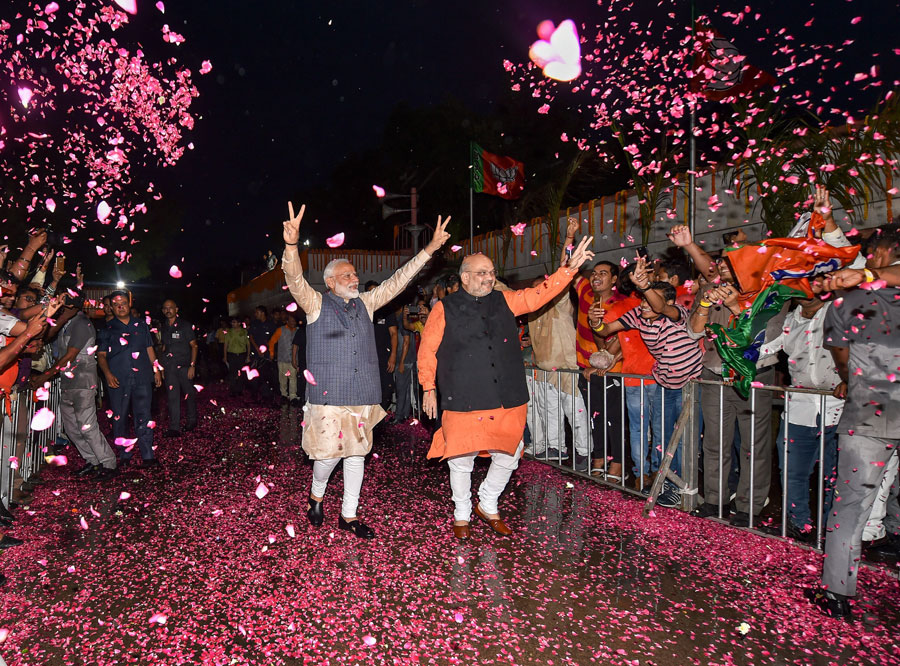Amit Shah was headed for a bigger victory than party patriarch L.K. Advani from the Gandhinagar Lok Sabha seat in Gujarat, achieved his twin claims of a bigger than 2014 victory for the BJP and securing a 50 per cent vote share in heartland Uttar Pradesh, leading his close associates to see him emerging as the official No. 2 in the next Narendra Modi government.
Besides Modi, the outcome of this general election is the story of an unusual arrival of Shah, the BJP chief. Though he had been widely regarded as the second-most powerful leader after Prime Minister Modi in the last five years, the poll results have established him as, many in the party acknowledge, “successor of Modi”.
Shah was leading by over 5.5 lakh votes in Gandhinagar. Already a Rajya Sabha member, Shah contested from this BJP stronghold seat by edging out 91-year-old Advani on the age criterion. Advani had won this seat by over 4 lakh votes in 2014 and Shah appeared to breach this by a good margin.
Advani had represented Gandhinagar in every eelction since 1989 and was deputy prime minister in-charge of the home ninistry in the Atal Bihari Vajpayee government. Many in the BJP now feel that Shah could follow it by getting appointed as home minister in the next Modi government besides being designated as the official No. 2. In the outgoing government, Rajnath Singh is home minister and the official No. 2.
“Amit Shah has achieved what no other BJP chief ever could. Despite the Modi magic, his organisational skills have achieved the unachievable,” a BJP leader said, adding that Shah deserved to be the “official No. 2” in the government and be projected as “successor of Modi”. Shah was a minister in the Modi regime in Gujarat.
Party leaders said Shah deserved to be rewarded not only because he won by a huge margin from Gandhinagar but for the BJP’s performance across the country, particularly in two crucial states — Uttar Pradesh and Bengal. Shah had given the slogan of “Abki baar 300 paar” (this time more than 300 seats) and the BJP was headed to achieve the tarrget.
After the BSP-SP-RLD “gathbandhan” was formed in UP, Shah had acknowledged they posed a challenge to the BJP but at the same time had said his target was to secure over 50 per cent vote share and blunt the effectiveness of the alliance. He seemed to have achieved that with the BJP boasting a 49.5 per cent vote share while counting was in progress.
Though the party looked to win at least 60 of the 80 seats in UP, down from the 71 it had won alone in 2014, the surge in vote share made this feat remarkable. This was way above the 42.34 per cent vote share of 2014 and also the 2017 Assembly polls in which the party had swept with 312 seats.
Shah celebrated this in his victory speech at the party headquarters on Thursday. He recalled how he had called party men at the BJP executive in Delhi ahead of the polls to gear up for a “50 per cent battle” in view of the Opposition’s alliance.
“Today I’m happy to announce that in 17 states we have crossed the 50 per cent vote share mark,” he said, crediting politics of “dynasty, casteism and appeasement”.
Shah spoke before PM Modi at the victory celebrations on Thursday and clearly appeared to be the second big mass leader of the party, speaking at length on how the BJP under him had made a huge foray in Bengal amid a roar from party cadres.










